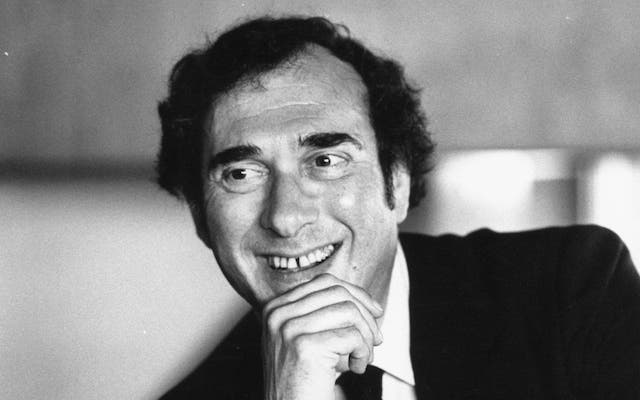Spotlight on Harold Pinter
Published on 10 May 2018
Last updated on 5 September 2025
Harold Pinter was born in Hackney in 1930 to British parents of Polish-Jewish descent. He was an only child and together with his family, survived the Blitz bombings of World War II during which they were evacuated to Cornwall and Reading. Considering how heavily bombed London was during this time, it's a miracle that his family managed to escape. These dark times were very influential on Pinter's work and all of his theatre pieces incorporate themes of loss, separation, loneliness and bewilderment.

It also comes as no surprise that Pinter sought a means to express himself after experiencing such a traumatic childhood. Following the Blitz, he turned to poetry at 12 years old. His family then returned to Hackney where Pinter began attending a London grammar school called Hackney Downs from 1944 to 1948. In the spring of 1947, his poetry began to garner attention when it was published in the Hackney Downs School Magazine. The year of 1950 saw his poetry reach the general public when it was published in *Poetry London *under his semi-pseudonym, Harold Pinta.
The Formative Years
Following grammar school, Pinter briefly attended the Royal Academy of Dramatic Art but dropped out in 1949, finding it inadequate. Having lived through the London bombings, he refused compulsory military service in 1948, opposed Cold War politics, and tried to register as a conscientious objector, leading to prosecutions and a fine before the government relented.
Acting Career
After evading National Service, Pinter began acting, debuting in Dick Whittington and His Cat at the Chesterfield Hippodrome (1949–1950). He briefly studied at the Central School of Speech and Drama before dropping out to pursue acting full-time. Performing across Ireland and England under the stage name David Baron—possibly in homage to a Jewish convert—he sought a fresh start, though his BBC mentor reportedly disliked the name change.
The Writer
In the late 50s, he began writing his own stage and television plays. Some of his most notable works include The Room* (1957), The Birthday Party (written in 1957 and first produced in 1958), The Dumb Waiter *(1957), *The Homecoming *(1964), and *Betrayal *(1978). Though The Homecoming won a Tony Award in 1967, Pinter’s early career was far from smooth. His best-known play, The Birthday Party, flopped in its 1958 London debut despite earlier regional success. A late but positive review by Harold Hobson may have salvaged Pinter’s future. The play has since been revived many times, most recently at the Harold Pinter Theatre
Nearly A Decade
From 1957 to 1968, Harold Pinter’s plays were labeled “comedies of menace,” a term coined by critic Irving Wardle, inspired by The Lunatic View: A Comedy of Menace. Rooted in the Theatre of the Absurd, these works reflect post-WWII existential themes—highlighting human helplessness, breakdowns in communication, and the absurdity of a world where people are threatened by the very systems they’ve created.
The Late 60s Until The Early 80s
From 1968 to 1982, Pinter wrote “memory plays” featuring lead characters who narrate events drawn from memory, often using memory as a weapon. Select memory plays of his include Landscape (1968), Silence (1969), No Man’s Land (1975), and A Kind of Alaska (1982). His memory plays Betrayal (1978) and Old Times (1971) are significant pieces because they feature more than one character reciting past events from their own perspective, thereby creating a cloud of uncertainty as to whose side of the story represents the truth.
The National Theatre
In 1979, Pinter voted for Margaret Thatcher’s conservative government as a protest vote in response to the National Theatre that was breathing down his neck and actively monitoring the production he was directing. Pinter later admitted that it was one of the most regretful acts of his life.
Following his memory play movement and his faux pas during the elections of ‘79, Pinter shifted his tone and began writing overtly political pieces for the remainder of his career. His political themes included oppression and human rights abuses, but he also focused on more abstract themes later on, including critiques on the level of ignorance that’s prevalent in upper-class society (1991’s Party Time and 1999’s Celebration). In addition to his plays, Pinter also wrote over two-dozen screenplays, many of which were either adapted for the stage or filmed.
Lasting Legacy
Harold Pinter passed away on Christmas Eve 2008 from liver cancer but his legacy lives on. In September 2011, the Ambassador Theatre Group (ATG) announced that the Comedy Theatre on Panton Street was to be renamed The Harold Pinter Theatre, and now, 10 years after Pinter’s passing, the theatre will be honouring the legendary playwright with a full-fledged season dubbed Pinter at the Pinter that will feature 16 theatre pieces from his illustrious oeuvre. The Pinter at the Pinter season ran from 6 September 2018 until 23 February 2019**.**
For more information on Pinter at the Pinter, click here.

By Nicholas Ephram Ryan Daniels
Ephram is a jack of all trades and enjoys attending theatre, classical music concerts and the opera.
